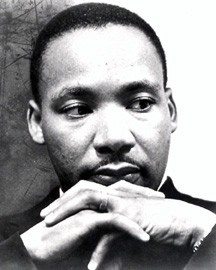Today’s national holiday marks the birthday of Martin Luther King Jr. He would have been 78. That’s younger by five years than two living ex-presidents, Jimmy Carter and George H.W. Bush, and yet he seems a figure from a far more distant past.
 Is it because he died so prematurely, killed by an assassin’s bullet, at 39? Or does he recede into history because someone of his towering stature is unimaginable in a BananaRepublic led by blustering moral pipsqueaks?
Is it because he died so prematurely, killed by an assassin’s bullet, at 39? Or does he recede into history because someone of his towering stature is unimaginable in a BananaRepublic led by blustering moral pipsqueaks?
Click these links: 1) to read or watch King’s greatest address, the “I have a dream” speech, of Aug. 28, 1963, which he delivered from the steps of the Lincoln Memorial in Washington, and 2) to hear an audio excerpt of his peerless “Letter From Birmingham Jail,” of April 16, 1963. Writing from his cell on a yellow pad of legal-size paper smuggled to him by his attorney, he says:
We know through painful experience that freedom is never voluntarily given by the oppressor; it must be demanded by the oppressed. Frankly, I have yet to engage in a direct-action campaign that was “well timed” in the view of those who have not suffered unduly from the disease of segregation. For years now I have heard the word “Wait!” It rings in the ear of every Negro with piercing familiarity. This “Wait” has almost always meant “Never.” We must come to see, with one of our distinguished jurists, that “justice too long delayed is justice denied.” We have waited for more than 340 years for our constitutional and God-given rights. … Perhaps it is easy for those who have never felt the stinging dark of segregation to say, “Wait.”
To read the whole letter, click this link. King defends “direct-action nonviolence,” explains its principles and expresses his bitter disappointment with white moderates who are “more devoted to ‘order’ than to justice.” Notice he has “almost reached the regrettable conclusion” that they are a bigger stumbling block to freedom and equality for blacks than the White Citizen’s Council or the Ku Klux Klan.
Shallow understanding from people of good will is more frustrating than absolute misunderstanding from people of ill will. Lukewarm acceptance is much more bewildering than outright rejection.
Listen to him speak on April 4, 1967, at Riverside Church in New York City about the difficulty of resistance during escalation of the Vietnam War:
Even when pressed by the demands of inner truth, men do not easily assume the task of opposing their government’s policy, especially in time of war. Nor does the human spirit move without great difficulty against all the apathy of conformist thought within one’s own bosom and in the surrounding world.
Finally, apply what he said then (“A time comes when silence is betrayal”) to the war in Iraq:
Somehow this madness must cease. We must stop now. … I speak for those whose land is being laid waste, whose homes are being destroyed, whose culture is being subverted. … I speak as a citizen of the world, for the world as it stands aghast at the path we have taken. I speak as one who loves America, to the leaders of our own nation: The great initiative in this war is ours; the initiative to stop it must be ours.
And wish like hell he were still alive to set an example and stiffen the spine.
Postscript: At least John Edwards is giving it a shot.




